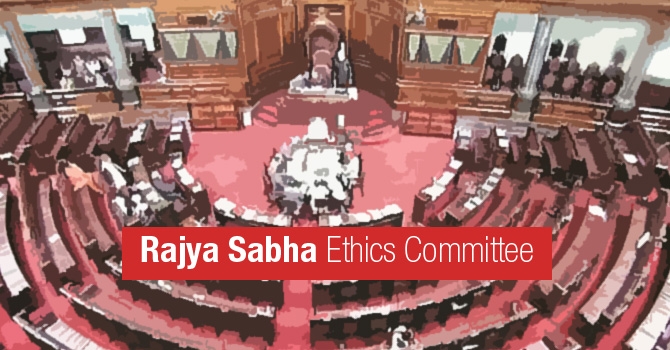The ‘Committee on Ethics’ of Rajya Sabha hasn’t really drawn too much of attention until now, when Vijay Mallya’s continuing membership as a Rajya Sabha member was questioned by the public, media and political groups.
As in any democratic organisation, the conduct of its members is critical for maintaining people’s trust and respect for that institution. All members of that institution must act and behave within acceptable norms, and in the case of Rajya Sabha, the ‘Committee on Ethics’ carries the authority and mandate to oversee the moral and ethical conduct of all its members.
The Committee is headed by a Chairperson, who, in turn, nominates 10 members to the panel. Based on feedback and suggestions from all members of the Rajya Sabha, the Committee has drawn upon a ‘Code of Conduct’ that governs all members of the Upper House.
Role of Ethics Committee
- The Committee is authorised to suggest changes to the Code of Conduct or offer amendments from time-to-time which is submitted by way of reports.
- The Committee on Ethics remains in office until the next Committee is nominated. In case of a casual vacancy, the Chairman temporarily fills that position. The quorum is five.
- In cases where a complaint is received against any existing member or if the Committee so deems fit, it can act suo motu against any member in specific cases, besides offering advice to members on matters pertaining to ethical standards and behaviour.
- The Chairperson holds the authority to report any unethical behaviour or act on part of any member of the House to the Committee for consideration and further action.
Transparency and Disclosure
As part of the Code of Conduct, all members are obliged to submit all relevant information of their movable and non-movable assets and liabilities, of self and immediate family members, including spouse, dependent son and/or dependent daughter, within a period of 90 days of taking the oath, under Article 99 of the Constitution.
The objective is to ensure that there is full disclosure and transparency of assets and the information recorded in the Register of Members’ Interests’ and is maintained by the Committee. Any member can request access to information maintained in the Register of Members’ Interests’ at any time.
Process of filing a complaint with the Committee on Ethics
- Any member of Rajya Sabha can file a complaint in writing with the Committee and against any member(s) in any matter pertaining to a breach in Code of Conduct.
- The Panel is also empowered to take suo motu cognizance in case it feels any members has breached the Code.
- In such cases, the Committee can demand that the concerned member present themselves before it and explain their act or behaviour.
- If necessary, the Committee can also demand documentary record or evidence from either the complainant or member against whom the complaint has been made.
- The Committee holds the right to withhold the complainant’s name if it so chooses but will not act in cases of unsubstantiated accusation or media speculation.
- If a case is sub-judice against any member, then the Committee will not intervene in that specific case against any member.
- It is this strict adherence to procedure and process that made the Committee on Ethics initially reject Vijay Mallya’s resignation only to accept it a day later, once the revised resignation fulfilled the required criteria for resignation by a member.
Authority to sanction members
The Committee is empowered to act against any member of the Upper House if it concludes that the said member has indeed violated the Code of Conduct. In such case, the Committee can exercise its options to either sanction the member, reprimand, seek apology, suspend the member for a specific duration, or impose any other form of sanction, as it deems fit.
The Report of the Committee
The Report of the Committee is an important document submitted by the Chairperson of the Committee to the Council. Once submitted, the Chairperson of the Committee or any member of the Committee representing the Chairperson, can move a motion with the Council for considering the report.
Once the report is submitted to the Council, any member can submit an amendment to the motion for consideration of the report.
Once the motion for consideration of the report is accepted, any member of the Committee or simply a member of Rajya Sabha can move a motion to accept the report along with its amendments, reject it, or seek clarification from any member, as the case may be.
Stressing the importance of the Committee on Ethics
For Rajya Sabha to uphold its reputation and democratic traditions, the Committee on Ethics plays an important role in ensuring that all its members adhere to the Code of Conduct.
The public awareness for this important function within Rajya Sabha has increased with recent events, and one hopes that the Panel will continue to guide all its members in maintaining high ethical standards in times to come.






